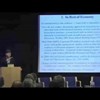richard

The future of work with Richard Freeman
Last October, Harvard professor of economics, Richard B Freeman gave a lecture on the future of work and the paradox of increased inequality despite higher levels of productivity and teamwork. The lec

The Future of Work with Richard B Freeman
The future of work: the paradox of increased team production and greater inequality in pay in the knowledge economy. A seminar from Stockholm on the 14th of October 2013. Labour economist Richard B Fr
Richard Bradley: Confidence and probability. Climate change assessments and policy decision making
Richard Bradley, professor at the Department of Philosophy, Logic and Scientific Method, London School of Economics and Political Science ABSTRACTThe periodic assessment reports of the Intergovernment
Counterfactual Desirability
The British Journal for the Philosophy of Science, 68(2), 2017: 485-533. Abstract The desirability of what actually occurs is often influenced by what could have been. Preferences based on such value de
Richard Arneson: Should we reward the deserving? Some puzzles
Richard Arneson is a political philosopher with a special interest in theories of social justice. AbstractDo plausible fundamental principles of justice incorporate the idea of rewarding the deserving?
How much scope for a mobility paradox? The relationship between social and income mobility in Sweden
Sociological Science 3:39-60. 10.15195/v3.a3. Abstract It is often pointed out that conclusions about intergenerational (parent–child) mobility can differ depending on whether we base them on studies of c
How Valuable are Chances?
Philosophy of Science, Vol. 82, No. 4, p. 602-625. DOI: 10.1086/682915 Abstract Chance Neutrality is the thesis that, conditional on some proposition being true (or being false), its chance of being true
Desire, Expectation, and Invariance
Mind, Volume 125, Issue 499, Pp. 691-725. Abstract The Desire-as-Belief thesis (DAB) states that any rational person desires a proposition exactly to the degree that she believes or expects the proposit
What is risk aversion?
The British Journal for the Philosophy of Science, doi.org/10.1093/bjps/axx035 Abstract According to the orthodox treatment of risk preferences in decision theory, they are to be explained in terms of th
What is a social pattern? Rethinking a central social science term
Theory & Society Abstract The main aim of this article is to start a discussion of social pattern, a term that is commonly used in sociology but not specified or defined. The key question can be phrsociologicalconcept of social pattern may look like. A useful and theoretically solid concept of social pattern can in our view be constructed by basing it on Weber’s concept of social action. This means thatboththe behavior of the actorsandthe meaning these invest their behavior with must be taken into account. The article ends with a brief discussion of how to use the concept of social patterns in an effective way and what may endanger such a use.








